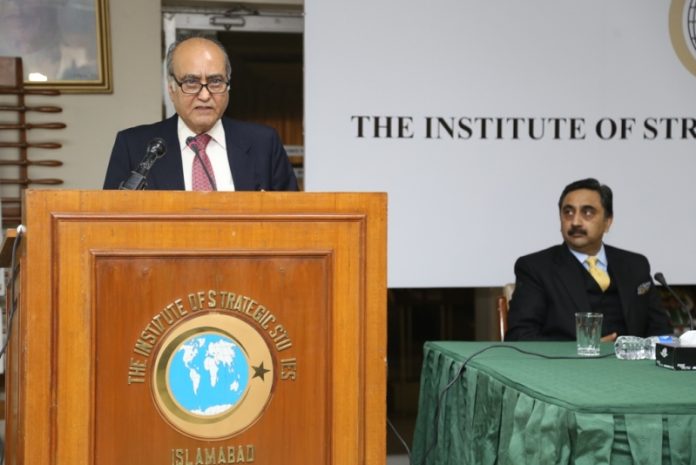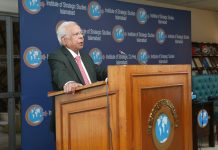Pakistan-India: Avoiding a Water War
Statement by Ambassador Khalid Mahmood
Chairman Institute of Strategic Studies (ISSI) Islamabad
(14 December,2016)
The 1960 Indus Water Treaty(IWT) which withstood all ups and downs in Pakistan-India bilateral relations including wars is being threatened to be scraped by India. On September 22, 2016 Indian Foreign Ministry Spokesman suggested that New Delhi could revoke IWT. Though the reasons for creating this hype by India could be its own internal political dynamics but Pakistan on its part cannot ignore the statements emanating from New Delhi. It is therefore, need of hour that Pakistan keeps a close eye on the developments and be fully prepared to counter any move by India that is intended to harm Pakistan economically or politically.
Signed in 1960 with the mediation of World Bank, Indus Water Treaty deals with six rivers. Three Eastern Rivers i.e. Ravi, Sutlej and Beas were allocated to India whereas, three Western rivers namely Indus, Jhelum and Chenab and their tributaries to Pakistan. Subject to certain limitations, India is allowed 20% of western rivers water for domestic and non-consumptive use., hydropower and agriculture.
Following an attack on a military base in Uri Sector, India without conducting a thorough investigation, blamed Pakistan for the attack. Besides claiming to have conducted a surgical strike inside Pakistan and declaring Pakistan a “terrorist state”[1] , India also resorted to applying pressure tactics by announcing that it would review the Indus Water Treaty. While saying that “Blood and water cannot flow together, Modi government decided to suspend the annual meeting of Indus Water Commissioners. It is important to mention here that annual meetings between the Indus Water Commissioners are mandatory under the treaty to exchange data and settle disputes. In addition to it, it was also decided to review the 1987 suspension of the Wuller Barrage/Tulbul Navigation Project on river Jehlum which Pakistan had opposed arguing that the proposed barrage violated the IWT. Progress on the construction of dams on western rivers was also reviewed in order to exploit the waters of western rivers to the fullest.
Similar references were again made by Indian Prime Minister recently regarding the waters of Eastern rivers that are under Indian control. While addressing a rally in Bathinda, Prime Minister Modi expressed his nefarious design of stopping “every drop of this water” [2]to Pakistan.
Responding to these provocations, Advisor to the Prime Minister on Foreign affairs Mr. Sartaj Aziz warned India that any such move would be considered as an “act of war”.[3] He also pointed out that this would set a wrong example in the region as well as around the world .Is India using the water card to pressure Pakistan and deflect attention from the unabated strong resistance movement in Indian Occupied Kashmir in the face of brutal Indian oppression.
There have been voices in India urging that India should withdraw from the treaty. However, a closer look at this suggestion would reveal that this might not be possible for India for a number of reasons- at least not in near future.
The Indus Water Treaty does not allow Pakistan or India to cancel or revoke the treaty unilaterally. Article 12(4) of the treaty clearly mentions that the termination of the treaty is only possible if both India and Pakistan draft a treaty in this regard and then ratify it.
Similarly, currently India does not have sufficient capacity to withhold waters of the rivers that were allocated to Pakistan. It will take years for India to build dams before it can pursue its nefarious designs.
Abrogating treaty unilaterally or even denying Pakistan its due share of water would set a bad example in the region. Before going ahead with any such move, India will have to keep in mind that it is a lower riparian country in its water sharing arrangement with China. Any such move would also send a wrong signal to Bangladesh and Nepal.
In addition, any such move would not be viewed favourably by the world community and would damage the image that India wishes to project for herself..
As has been discussed above, it is not possible for India to pursue its agenda at the moment, but Pakistan on its part cannot ignore or sit idle in the face of this Indian veritable threat. Stakes are too high for Pakistan. According to IMF Pakistan is one of the world’s most water stressed country with per capita annual water availability of roughly 35, 300 cubic feet-the scarcity threshold. And the country’s water tables are plummeting. Being an agricultural country Pakistan’s economy depends on the uninterrupted flow of waters in these rivers. Agriculture constitutes 19.8% of its GDP and employs 42.3% of labour force. It is therefore absolutely imperative that Pakistan is prepared to meet any eventuality. All necessary work from legal and technical aspect should be done in advance in case Pakistan has to fight a legal battle for its rights. Pakistan should use all available diplomatic means so that international community is made aware of Indian intentions and its impact on Pakistan. More scholars and researchers should be encouraged to work and develop expertise in this particular area. We should learn from the bad experience of Baglihar and Kishenganga arbitrations..
One can only hope that sanity will prevail and the assertion of a number of scholars that the future wars will be fought over water does not become a nightmare for the people of South Asia. Instead, the two countries should be working on trans-boundary cooperation to alleviate impact of Climate Change and groundwater depletion.
References:
[1] – ‘Pakistan a terrorist state’ – Rajnath spews vitriol ahead of UN General Assembly Session, Dawn, September 18, 2016.
[2] – “River waters to be stopped from going waste in Pakistan: PM Modi on Indus Water Treaty,” Times of India, November 25, 2016
[3] – “Revocation of Indus Waters Treaty can be taken as an act of war: Sartaj Aziz,” Dawn, September 27, 2016














